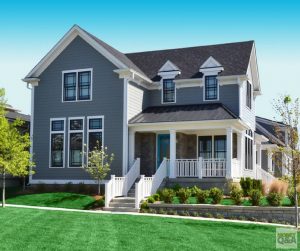
Buying a starter home can help future homeowners save more money for a larger home in a better area in the future. For many years, buying a starter home was the normal path to homeownership for young individuals and couples. But, that trend seems to be dying out.
You Should Not Skip Buying a Starter Home
Here are a few reasons why avoiding a starter home might not be a good idea.
Starter Homes Are Stepping Stones
Don’t look at buying a starter home at the end of the goal for your home purchases. Use it as a stepping-stone, like it was meant to be.
Use this time to get your credit score and credit report in order. Do you have debt that you can pay off while you wait to find the perfect home of your dreams? Use the time after purchasing a starter home to clean up your credit report so that you can get the best rate when you’re ready to purchase a larger house.
Buying a starter home is more than just finding a home to live in. It’s about learning. A starter home helps you learn what you like about a home and neighborhood. A starter home lets you make mistakes.
What if you purchased your dream home in a neighborhood that you ultimately don’t like? What if you later find out that the school district isn’t the best? You don’t want to make these kinds of mistakes with your dream home. Now is the time to make mistakes when buying a starter home.
Buying a starter home lets you learn how to be a homeowner. Do you want a big yard? Did you learn later in life that you like home repairs and gardening?
Now is the time to make your mistakes early in life and early in home ownership before you start looking for the home of your dreams. Buying a starter home can help you, not only financially, but to learn about yourself and what you like in a home.
According to @ConsumerReports 75% first-time homebuyers are planning to skip buying a starter home. Click To TweetHomes Are Long-Term Investments
To recoup the costs of buying the home, it’s best to hang onto your investment for several years before selling it. New homeowners can turn their starter home’s into a larger down payment for the home of their dreams later.
Or in a scenario where you might not want your home sold, there’s always the prospect of passing it down to your next of kin, maybe with the help of a well-crafted quitclaim deed. This will assure them a place to stay and maybe they will make it into an investment themselves.
Don’t be in a hurry to move onto something else. Continue to build your equity and wait for the housing market in your area to pick up steam once again. Many areas of the country still haven’t recovered from the housing crisis of 2008. Patience is the key to earning a higher selling price in the future when you sell your home to move up. But, it takes time.
But, if you’re planning on moving to a new city or state soon or starting a family, then you might want to aim for your home that meets your family’s goals. You want to avoid or limit the financial losses that come with treating a mortgage like a short-term investment.
Bigger Down Payment Equals More Home Equity
Often, people see their starter homes as an opportunity to put a smaller down payment down. They view buying a home as a financially preferable alternative to continuing to rent.
However, a smaller down payment means you’ll have to pay PMI on the home for at least a few years until you reach the 20% in equity. And, you’ll have less equity stored up for when you want to upgrade.
In this instance, it’s probably better to wait and save up a larger down payment for a home you actually plan on staying in long-term.
But, if you have enough for a down payment, a starter home can be a great choice for many people. You will have that much more equity in your home with a large down payment that you can parlay into a larger home later in life.
Starter Home Shortage Problems
Since the housing crisis of 2008, builders have been extremely reluctant to resume single-family homebuilding projects. Now, there is much more emphasis on building condos and apartment complexes, which means there is a crippling shortage of entry-level homes.
When there are a low supply and high demand, the rules of economics say home prices will naturally increase. This has been the case for starter homes in many areas of the United States.
Starter homes with fewer amenities are now much more expensive than they used to be. But, don’t like that dissuade you from buying a starter home.
A starter home is like working for minimum wage. It’s not meant to be your final dream house. A minimum wage job isn’t meant to be your dream career.
Don’t look at buying a starter home at the end of the goal for your home purchases. Use it as a stepping-stone, like it was meant to be.
Are you in the market to buy a starter home? What’s keeping you from making the purchase? Are you looking for the home of your dreams instead and skipping buying a starter home?

You are correct. There is a shortage of smaller houses in my area. I am, however, almost in a commutable distance to NYC. My wife and I live in a 1700 foot ranch. We have the smallest house on our street. It would be considered a starter house by most people. For us, it will be our finisher house too. That is unless we move to a warmer climate after FIRE.